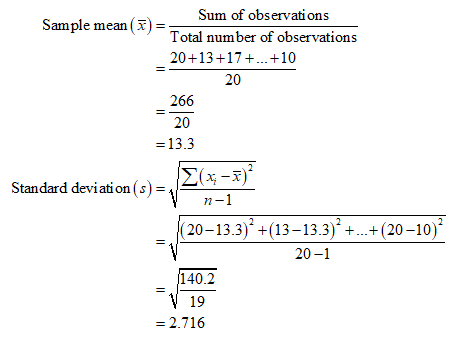A survey was done of smartphone usage. Shown below is the talk time in minutes per day for a set of randomly selected users and days. 20 13 17 13 11 12 13 15 10 10 13 12 10 13 18 14 13 15 14 10 I put the data into StatCrunch and found that the mean was 13.6 minutes per day with a standard deviation of 2.7 minutes per day. Use a 0.10 significance level to test the claim that the mean talk time for smartphone users is less than 14 minutes per day. What is/are the critical value(s)?
Continuous Probability Distributions
Probability distributions are of two types, which are continuous probability distributions and discrete probability distributions. A continuous probability distribution contains an infinite number of values. For example, if time is infinite: you could count from 0 to a trillion seconds, billion seconds, so on indefinitely. A discrete probability distribution consists of only a countable set of possible values.
Normal Distribution
Suppose we had to design a bathroom weighing scale, how would we decide what should be the range of the weighing machine? Would we take the highest recorded human weight in history and use that as the upper limit for our weighing scale? This may not be a great idea as the sensitivity of the scale would get reduced if the range is too large. At the same time, if we keep the upper limit too low, it may not be usable for a large percentage of the population!
QUESTION 21
-
A survey was done of smartphone usage. Shown below is the talk time in minutes per day for a set of randomly selected users and days.
20 13 17 13 11 12 13 15 10 10 13 12 10 13 18 14 13 15 14 10 I put the data into StatCrunch and found that the
mean was 13.6 minutes per day with a standard deviation of 2.7 minutes per day.Use a 0.10 significance level to test the claim that the mean talk time for smartphone users is less than 14 minutes per day.
What is/are the critical value(s)?
The sample mean and standard deviation are obtained as follows:

Step by step
Solved in 2 steps with 4 images









